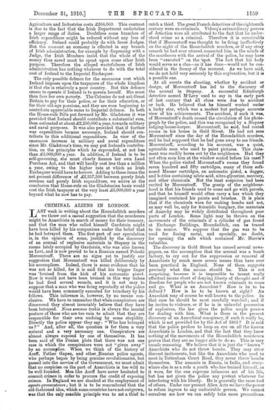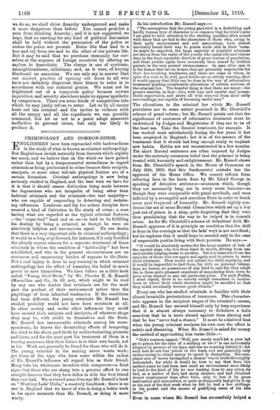CRIMINAL ALIENS IN LONDON.
LAST week in writing about the Houndsditch murders we threw out a casual suggestion that the murderers might be Anarchists in search of money for their treasury, and that the man who called himself Gardstein might have been killed by his companions under the belief that he had betrayed them. The first part of our speculation is, in the opinion of some, justified by the discovery of an arsenal of explosive materials in Stepney in the rooms lately occupied by Gardstein, who was also known as Levi, and is now proved to be a Russian named Poloski Morountzeff. There are no signs yet to justify our suggestion that Morountzeff was killed deliberately by his accomplices. Indeed, there is some evidence that he was not so killed, for it is said that his trigger finger was 'bruised from the kick of his automatic pistol. Now it would not have been bruised in this way unless he had fired several rounds, and it is not easy to suppose that a man who was firing repeatedly at the police would have been summarily executed for treachery by his fellows. This inference is, however, by no means con- clusive. We have to remember that when conspirators are discovered they almost invariably believe that they have been betrayed. Nous sommes trahis is always the mental posture of those who are too vain to admit that they are responsible for their own undoing by some stupidity. Directly the police appear they say: " Who has betrayed us ? " And, after all, the question is for them a very natural and a very necessary one. Conspirators are almost always exposed by one of themselves. It has been said of the Fenian plots that there was not one case in which the conspirators were not " given away " by an accomplice. When we think of the history of Azeff, Father Gapen, and other,Russian police agents, who perhaps began by being genuine revolutionaries, but passed into the service of the Government, we must admit that no suspicion on the part of Anarchists is too wild to be well founded. Men like Azeff have never hesitated to commit crimes in order to procure the credit of exposing crimes. In Kagla.nd we are shocked at the employment of agents provocateurs ; but it is to be remembered that the old-fashioned idea, which some countries have not outgrown, was that the only sensible principle was to set a thief to catch a thief. The great French detectives of the eighteenth century were ex-criminals. Vidocq's extraordinary powers of detection were all attributed to the fact that he under- stood crime as a criminal. Therefore it is conceivable that if Morountzeff was thought to be firing ineffectively on the night of the Houndsditch murders, or if any stray remark he had ever uttered connected him in the minds of the murderers with the arrival of the police, he may have been " executed " on the 'spot. The fact that his body would serve as a clue—as it has done—would. not be con- sidered in the frenzy of the moment. As we have said, we do not hold very seriously by this explanation, but it is a possible one.
At all events the shooting, whether by accident or design, of Morountzeff has led to the discovery of the arsenal in Stepney. A successful Edinburgh detective named M'Levy used to say in the early part of last century that all clues were due to accident or luck. He believed that he himself worked under a lucky star, which was a modest but perhaps accurate view of his achievements. The accident, if such it was, of Morountzeff's death caused the circulation of his photo- graph by the police, and this was recognised by a Stepney lodging-house-keeper. Morountzeff, he said, had rented rooms in his house in Gold Street. He had not seen Morountzeff since the day of the Houndsditch murders, and he had supposed that he had gone away to see friends. Morountzeff, according to his account, was a quiet, agreeable man who used to paint pictures. This state- ment was readily borne out by the neighbours. Had they not often seen him at the window seated before his easel ? When the police visited Morountzeffs rooms they found seven hundred and fifty cartridges, many of them soft- nosed Maser cartridges, an automatic pistol, a dagger, and bottles containing nitric acid, nitro-glycerine, mercury, and other chemicals. Not the least suspicion had been excited by Morountzeff. The gossip of the neighbour- hood is that his friends used to come and go with parcels, and that he himself would often carry a box which they imagined contained his paints and brushes. It is plain that if the chemicals were for making bombs and not, as may well be, only for Scientific burglary, the materials of Anarchy may be widely distributed throughout poor parts of London. Some light may be thrown on the movements of the criminals if a cylinder of gas found at Exchange Buildings, Houndsditch, can be traced to its source. We suppose that the gas was to be used for fusing metal, and specially, no doubt, for opening the safe which contained Mr. Harris's valuables.
The discovery in Gold Street has caused several news- papers, on the assumption that the arsenal was a bomb factory, to cry out for the suppression or removal of Anarchists by much more severe means than have ever been practised in England. None of them suggests precisely what the means should be. This is not surprising, because it is impossible to invent really effectual means short of denying liberty of thought and of freedom for people who are not known criminals to come and go. What is an Anarchist ? How is he to be defined ? How is he to be known at sight ? An Anarchist may of course be well known to the police. In that case he should be most carefully watched; and if he incites to violence, or if he is in unlawful possession of explosives, the law gives the police ample powers for dealing with him. What is there in the present discovery of an Anarchical conspiracy, if such it really be, which is not provided for by the Act of 1883 ? It is said that the police profess to keep an eye on all the known Anarchists in London, and that the fact that they knew nothing of the movements of the Houndsditch murderers proves that they are no longer able to do so. This is very unsafe reasoning. We believe that it is just the " known very unsafe who do not throw bombs. They may utter discreet incitements, but like the Anarchists who used to meet in Tottenham Court Road, they never throw_ bombs themselves. The assassin in Russia, in India, and every- where else is as a rule a youth who has trained himself, as it were, for the one supreme infamous act of his life, but has not given the police any pretext whatever for interfering with his liberty. He is generally the mere tool of others. Under our present Alien Acts we have the power to refuse ingress to any undesirable person. We cannot ourselves see how we can safely take more precautions. we do so, we shall drive Anarchy underground and make it more rlengerous than before. You cannot prohibit a man from thinking Anarchy ; and it is not suggested, we hope, that no meeting for any kind of political discussion shall be held without the permission of the police or unless the police are present. Rules like that lead to a hue and cry from one end to the other of our private life. But it may be said that we purchase immunity for our- selves at the expense of foreign oountries by offering an asylum to Anarchists. The charge is one of cynicism, =neighbourliness, selfishness, and., as it were, of levying blackmail on assassins. We can only say in answer that our ancient practice of opening our doors to all who have not definitely disproved their fitness to enter is in accordance with our national genius. We must not be frightened out of a temperate policy because unwise inquisition and severity elsewhere make us appear apathetic by comparison. There are some kinds of competition into which we may justly refuse to enter. Let us by all means hunt out the criminal and the inciter to violence with all the energy and all the expedients we can possibly command, but let us not in a panic adopt measures ineffective to prevent crime, but only too likely to produce it.







































 Previous page
Previous page